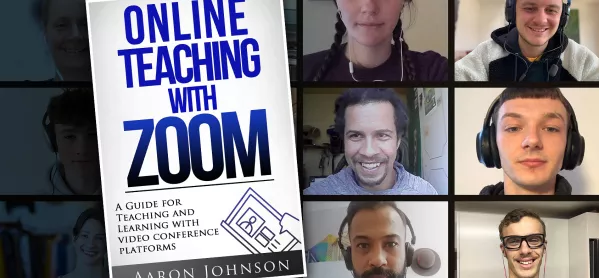- Home
- Book review: Online Teaching with Zoom
Book review: Online Teaching with Zoom

Online Teaching with Zoom: a guide for teaching and learning with videoconference platforms
By Aaron Johnson
Publisher: Aaron Johnson
Details: 176pp, £10.08
ISBN: 978-0989711630
If a time-travelling Victorian surgeon wandered into a 2019 operating theatre, he would feel his inadequacy very keenly. But his school-teaching sidekick could probably have made a decent living on supply.
Until recently, wary teachers had auditioned technology and confined it to a supporting role in the wings. However, the pandemic has brought it firmly centre stage.
If teleconference teaching is the brightest star in the new edtech firmament, Aaron Johnson is the pushy agent who can’t quite believe his luck. Online Teaching with Zoom is his impeccably timed sequel to Excellent Online Teaching. Both are founding texts in the teleconferencing subgenre that is set to surge.
As children return to their real-room rows and a reassuring teaching style that their great-great grandparents would recognise, there’s an understandable nostalgia for old certainties. But local lockdowns loom.
Optimising online learning
Just where does teaching by teleconference fit into the long-term scheme of things? So far, it’s been what Johnson calls a real-time “synchronous” safety net, and will be again should schools need to revert to a tiered and blended shift pattern.
But he thinks its longer-term value will be as a prerecorded “asynchronous” tool within learning-management system platforms, such as Moodle, where curated multimedia activities and resources form dazzling online courses and are merely “facilitated” by teachers.
It’s a convincing vision of a future where dual-access to a real/virtual curriculum is likely to become a statutory entitlement that can be accessed anytime, anyplace, anywhere.
Despite Johnson’s stated aim to get the tech out of the way “so that we can focus on teaching and learning”, it’s actually in the basic practicalities that he excels. He treats the reader as an absolute beginner, helping them to navigate the bells and whistles that optimise online learning.
He is particularly convincing when empathising with pupils’ viewpoints, and argues that the virtual classroom needs a set of classroom protocols or etiquette, and that this generation of interrupted learners will value predictability over variety.
Perils of cognitive overload
The section on organising virtual breakout groups is especially helpful. But, more generally, Johnson struggles for consistency when synching teleconferencing with pedagogy.
He cites the aphorism of media producer, consultant and author Phil Cooke that, “The most valuable commodity of the 21st century will be undivided attention,” but advocates an interactive, dialogic teaching style, which seems giddy, overambitious and fraught with the perils of cognitive overload.
With pupils having to juggle so many extraneous processes in Johnson’s virtual classroom, it’s the actual learning that may get lost in translation. And there’s the rub.
Johnson does little to assuage the concerns of teachers who have always suspected that technology fragments the undivided attention that deep learning needs.
But if Zooming never becomes more than just a contingency safety net for lockdown learners, it will still be a very good one: even the biggest technophobes will admit that Johnson is an engaging guide into the sunlit uplands.
The nerdiness of an edtech fanboy
He fizzes along with the endearing nerdiness of an edtech fanboy - even if he sometimes strays too close to the genre of self-improving empowerment.
But Johnson is too canny to lose sight of the main prize. He’s in the right place at the right time, and he knows it. He explains his decision to omit the screenshots and images that tech duffers would have found so helpful, because he has set up his own website to host the visual elements. Johnson clearly understands the value of multiple revenue streams.
But haven’t we been here before? Edtech has certainly overpromised and underdelivered in the past: its claims to be the new educational theory of everything have never quite convinced.
Transforming our professional lives
This time is different, though. Teleconferencing will transform our professional lives. It’s going to be the go-to vehicle for meetings, conferences, workshops and continuous professional development; any teacher with leadership ambitions will need to become a skilled and confident practitioner.
And something more seismic is happening. In 2018, Organisation for Economic Cooperation and Development education director Andreas Schleicher controversially predicted that the teacher’s traditional role of “knowledge dissemination” would be done better by technology. He argued that teachers would be freed up to become coaching guides from the side.
Teleconferencing alone will not make teachers relinquish their starring role at the centre of the classroom stage just yet, but a fully integrated, learning-management system running multimedia curriculum software will. That book is yet to be published, but somebody somewhere is writing it.
When video conferencing is just another star in the dazzling edtech constellation, we’ll probably wonder what all the fuss was about.
Meanwhile, we’re going to need opportunists like Aaron Johnson, and Online Teaching with Zoom is a very serviceable primer. He’s offering to get you in on the edtech ground floor. But one day soon we’ll all be wandering on the top floor, just as dazed as that Victorian surgeon.
Sean Smith is a freelance journalist and former teacher. He tweets @seansmithwrites
Keep reading for just £1 per month
You've reached your limit of free articles this month. Subscribe for £1 per month for three months and get:
- Unlimited access to all Tes magazine content
- Exclusive subscriber-only stories
- Award-winning email newsletters



